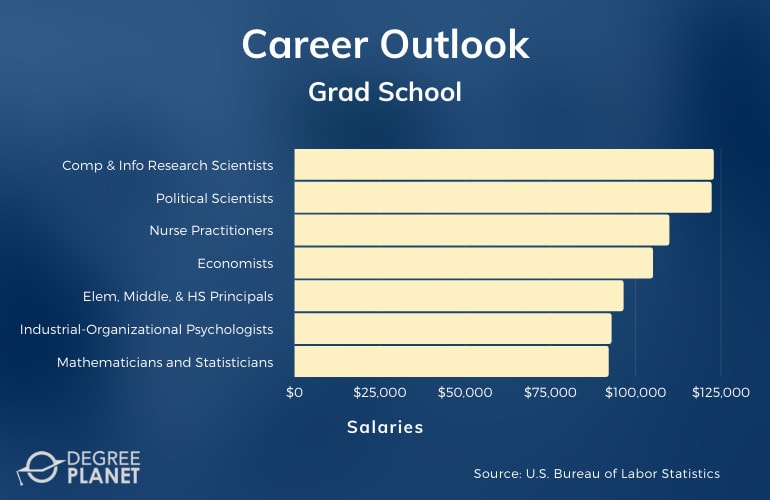Is grad school worth it? You might consider pursuing a master’s degree if you’re interested in professional advancement or higher pay.

Editorial Listing ShortCode:
Those with master’s degrees often make more money and hold more prestigious positions than workers with less education. Depending on your career goals, an advanced degree could also be a good stepping stone toward a doctorate.
Is Grad School Worth It?

Yes, grad school is worth it for many students. Jobs requiring a master’s degree for entry are projected to grow at a rate of 15% in the next 10 years (Bureau of Labor Statistics), much faster than the average job growth for all occupations.
Common masters degree careers include computer and information research scientist, nurse practitioner, school principal, statistician, and industrial-organizational psychologist. According to data from the Bureau of Labor Statistics, higher education often pays off in the form of salary increases.
Graduate school can look good on a resume. It may open doors to supervisory positions, management roles, and maybe even the C-suite. After getting a master’s degree, you might qualify for advancement within your current company. You could also start looking around for other employers who’d give you more responsibilities and a higher salary.
Editorial Listing ShortCode:
There are some jobs where a graduate degree isn’t just an advantage—it’s a necessity. For example, you’ll need a graduate degree if you want to pursue licensure as an advanced practice nurse, a licensed clinical social worker, a school administrator, or a marriage and family therapist.
Even in fields where licensure is not required, employers usually favor candidates who have earned a graduate degree. Examples of such jobs include being an economist, an urban planner, or a computer scientist.
A master’s degree also provides valuable preparation for doctoral studies. If you have your sights set on a terminal degree, a master’s may help you get there.
Do grad schools care about GPA? Some definitely do, but it’s worth noting that if your undergraduate GPA is discouraging you from applying to a graduate program, some universities have graduate schools with low GPA requirements.
How to Decide Whether Grad School Is Right for You

Enrolling in a masters degree program can be a big step in your academic and professional career, but it may not be the best course of action for everyone.
You may be wondering, “Is graduate school worth it?” If you identify with any of the following, you may consider pursuing an advanced degree as the next chapter in your educational journey.
1. You have a plan, and education will help you get there.

A graduate program shouldn’t be a time-filler while you try to figure out what to do with your life. Rather, it should serve as a specific step toward your professional goals.
If you want a license or a job that requires an advanced degree, then it makes sense to enroll in graduate school to meet your career goals. You may also want to get a master’s if promotions in your company are typically offered only to people with graduate educations.
A salary bump may be another concrete goal that a master’s might help you achieve, especially if your industry has a proven track record of paying more to those with higher degrees.
Are you reluctant to apply to graduate school because you feel you don’t have strong references? It may be worth looking into one of the growing number of universities that offer graduate programs that don’t require letters of recommendation or references.
2. You’re passionate about your field of study.

When studying for a masters degree, you may spend plenty of time hitting the books, listening to lectures, or writing papers. Enjoying the topics that you’re learning about can make all the difference.
If you’re committed to getting more education, you may want to make sure it’s in an area that you really want to study.
3. You’ve figured out how to make grad school fit into your life.
Graduate schools are a big commitment. Some people quit their jobs or move across the country to enroll in graduate programs. If that’s your plan, then you may consider whether you have the means to support yourself, such as a good nest egg or a partner who can help pay the bills.
Online programs are a more flexible option for many graduate students. You may be able to keep working your full-time job while completing your coursework during the evenings or weekends.
5 Things You Can Do with a Graduate Degree
Some jobs require the expert-level training that you can receive in a graduate degree program.
Editorial Listing ShortCode:
Graduate degrees are particularly valuable for the 5 careers below. Jobs in these important fields pay commendable salaries and are growing quickly. In some cases they’re growing much quicker than the national average.
1. Computer and Information Research Scientist

Computer scientists drive new developments in computing and technology. You could contribute to advancements in robotics, networking, or programming.
If you’re interested in tech and enjoy research and experimentation, then a masters in computer science or computer engineering may set you up for a lucrative career. Because of society’s dependence on technology, the Bureau of Labor Statistics says that work for information research scientists is growing at a 15% rate over the next decade.
2. Industrial-Organizational Psychologist

While most psychologists, particularly those in clinical practice, need a doctoral degree, industrial-organizational psychologists are often the exception.
As an IO psychologist, you’d apply psychological principles to improve workplace practices related to policies, training procedures, or office culture. Many IO psychologists are corporate employees.
A background in quantitative research can help you succeed in this field, so that may be an emphasis to look for in a master’s program if you’re interested in this career path.
3. Nurse Practitioner

If you’re already an RN, becoming a nurse practitioner might be a natural next step in your career. This role could give you greater authority in medical settings and increase your scope of practice.
Being a nurse practitioner is just one type of advanced practice registered nurse that you could become with a Master of Science in Nursing. Other options include being a nurse midwife or a nurse anesthetist.
4. School Principal

After spending some time as a teacher, you might be ready to move into an administrative role. Becoming licensed as an administrator usually requires a master’s degree.
You could be a principal in an elementary, middle, or high school. Principals oversee staff, students, and school operations and make decisions that promote academic success. Becoming an instructional coordinator is another education-related job that you could pursue with a graduate degree.
5. Statistician

If numbers are your strength, you may find success in the world of statistics. Statisticians gather information, create models, and analyze data to inform decisions.
A master’s degree in mathematics, statistics, or economics could lead to job security. According to the Bureau of Labor Statistics, jobs for mathematicians and statisticians are growing at a 33% rate through the next decade. A background in science or computers may contribute to your success in this field.
Grad School Alternatives
The best time to earn a master’s degree is when it contributes to your personal career goals.
Editorial Listing ShortCode:
The following alternatives may also be worth considering if they would help you achieve those same goals.
- Certification programs. Taking courses in graduate schools and passing exams could lead to industry certifications with the power to increase your expertise and bolster your resume.
- Doctoral degree. You don’t necessarily need to get a master’s before pursuing a doctorate. If your ultimate goal is to earn a terminal degree, you might be able to save time and money by skipping straight to doctoral studies.
- Work experience. In some industries, professional experience is the primary key to landing management roles. Although you might advance more quickly with a master’s, working your way up one promotion at a time could be the more cost-effective route to the top.
Consulting mentors in your field may help you decide which of these options would produce the best results for you.
Careers & Salaries

According to the Bureau of Labor Statistics, people with a master’s degree earn an average annual salary of about $78,210.
| Careers | Annual Median Salaries |
| Computer and Information Research Scientists | $126,830 |
| Political Scientists | $125,350 |
| Nurse Practitioners | $111,680 |
| Economists | $108,350 |
| Elementary, Middle, and High School Principals | $98,490 |
| Industrial-Organizational Psychologists | $96,270 |
| Mathematicians and Statisticians | $93,290 |
| Sociologists | $86,110 |
| Urban and Regional Planners | $75,950 |
| Epidemiologists | $74,560 |
These careers require a master’s degree as the minimum educational requirement. Having a master’s may also help you advance to supervisory positions in other lines of work. For example, you may be better qualified as a business manager or an executive after earning a graduate degree.
Is It Better to Go Straight to Grad School?

There are perks to earning a graduate degree right away, but there are also perks to waiting a while.
If you start your graduate program directly following your bachelor’s degree, you may still be in a school frame of mind. Some schools even offer combined programs so you can earn both a bachelor’s degree and a master’s in 5 years or less.
By waiting a while to start your graduate program, you can gain professional experience first. Your time in the workforce may help you draw connections between classroom lessons and real-life situations.
No matter which approach you choose, you should end up with a valuable education that supports your career ambitions.
Is It a Good Idea to Get a Master’s Degree?

A master’s degree may be worth considering after earning your bachelor’s degree if it would help you achieve your career and salary goals.
Graduate school can help you become an expert in an area that interests you. A master’s degree program would allow you to explore topics that may enhance your professional practice or equip you for leadership roles.
Editorial Listing ShortCode:
With both a bachelor’s degree and a master’s degree on your resume, you might be able to start a new job, apply for a promotion, or request a raise.
How Much Does Graduate School Cost?
The cost of grad schools can vary greatly among institutions, but many universities charge graduate students between $400 and $900 per credit hour. You may be able to keep your graduate school expenses down if you qualify for financial aid or for student loans.
Government assistance and scholarships are some of the primary sources of student aid for those who meet eligibility. Some employers will contribute to your graduate school cost as well. Other options to help graduate students in paying the cost of tuition are low-interest student loans.
Getting Your Graduate Degree Online

If a graduate degree could benefit your life and career, then it may be time to head back to school. After graduation, you may qualify for a better job or to earn more money.
Figures from the Bureau of Labor Statistics show that earning a master’s degree may lead to an average annual salary of $78,210, depending on your chosen field. If you’re seriously considering taking the next step in your schooling and career, you may begin searching for accredited online graduate programs today.

